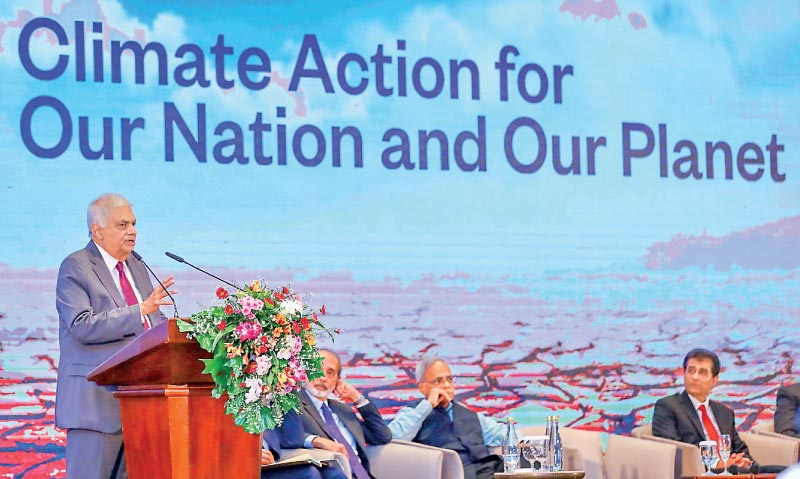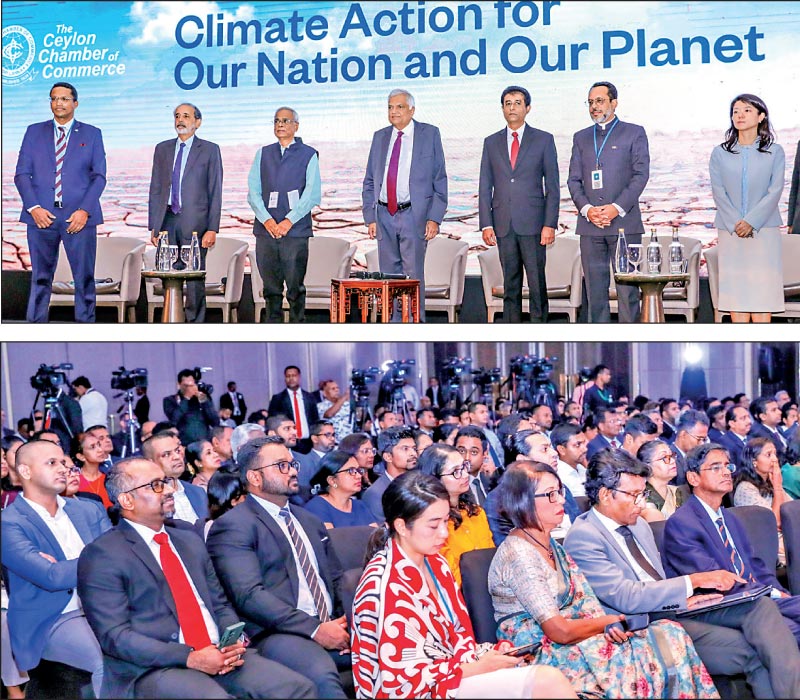Wednesday Feb 25, 2026
Wednesday Feb 25, 2026
Thursday, 9 May 2024 02:49 - - {{hitsCtrl.values.hits}}

By Darshana Abayasingha
President Ranil Wickremesinghe on Wednesday said that his task to restore the country’s economy is nearing its end and that they have to now focus on the next step.
“My task as president has been to restore the economy. In other words, to stabilize the economy. That task is nearing an end and we have to now focus on the next step,” he said.
“We can’t carry on with this economic model, which certainly hasn’t worked,” he said, adding that Sri Lanka has transformed itself into an export-oriented economy and a highly competitive economy.
For this purpose, Wickremesinghe stated that the government will be introducing legislation in parliament, which will ensure that all government policies focus on the transformation to a highly competitive export-oriented economy. He said the bill will most probably be gazetted next week.
The President revealed that one of the items in the bill, in carrying out this transformation, is to ensure that Sri Lanka achieves net-zero emissions by 2050.
“And I can tell you we will achieve it before that. Sri Lanka can do it,” he declared.
He made these remarks while addressing the inaugural session of the ‘Sri Lanka Climate Summit’ which commenced on Tuesday at the Shangri-La, Colombo.
The President emphasised on-going efforts to enact unified legislation addressing environmental protection and climate change.
He highlighted the government’s commitment to crafting economic policies geared not only towards fostering export-oriented competitiveness but also towards transitioning to a green economy, aiming to achieve net-zero by 2050.
Acknowledging the recent prolonged spells of extreme climate conditions as indicative of future climate change impacts, the President stressed the urgency of addressing climate mitigation measures promptly.
During his address, President Wickremesinghe highlighted the nation’s proactive approach to combating climate change. He announced the establishment of a dedicated climate change centre in Sri Lanka and his instructions to the officials to model legislation based on the United Kingdom’s Climate Act, endorsed by global financial institutions.
The President emphasised the significance of Sri Lanka’s role in addressing climate change, particularly within the Indian Ocean and the tropical belt and outlined plans for the International Climate Change University to be established in the country.
The inaugural Sri Lankan Climate Change Conference, hosted by the Sri Lanka Chamber of Commerce, commenced yesterday under the theme “Climate Action for our Nation and the Planet.” Scheduled to run until 9 May, the summit aims to foster a comprehensive understanding of the multifaceted climate crisis, both from a global and national standpoint. It seeks to assess potential disruptions to critical sectors of the economy and deliberate on policy reforms necessary for transitioning towards a low-emission, climate-resilient economic framework.
Addressing the inauguration, UNDP Sri Lanka Resident Representative Azusa Kubota said progressive climate change action has suffered from siloed functions, and noted the private sector globally could become the glue that brings together policy and actionable platforms. She noted the third generation National Determined Contributions on climate change coming out in 2025 will include more significant participation by the private sector, and affirmed many businesses in Sri Lanka understand the importance of community engagement, but they simply need to transform that to scale for wider reach. This could potentially be a financing gap, which the UNDP is now globally looking to bridge.
Eminent Biodiversity Scientist, Dr. Rohan Pethiyagoda, said a national plan above politics is critical with stability, and made light of concerns held by some sections on the viability of nuclear power. “We have this overblown fear of nuclear power, but that is really something to think of. The nuclear plants that are coming to South India are selling at about $ 0.5 cents, so they are significantly much cheaper as well apart from being clean. If you look at Chernobyl and the more recent Fukushima Nuclear plant crisis, no one died from the latter. So there is a clear advancement from then to now,” he explained.
Dr. Pethiyagoda explained that much of Sri Lanka’s primary trade crops are resilient to climate change, but rising sea levels are likely to cause more impacts to the country and its economy. He noted achieving Net Zero carbon as a country by 2025 would require investments of up to $ 100 billion – factoring 13 billion for corruption – but noted he felt this was possible. However, he called for a measured and pragmatic approach as opposed to stampeding as seen by much of the EU leadership, which has resulted in a large number of U-turns in European environmental policy despite early statements. “We need economic development to get there and that is the challenge for the private sector. So, we are counting on you,” Dr. Pethiyagoda said.
Addressing the gathering Indian Institute of Technology Madras Park President Prof. Ashok Jhungjhungwala noted that countries in South Asia must think regionally as opposed to individuals, and pay significant attention to developing recycling technologies such as for batteries and solar panels. “Let’s not always look to the west for solutions, let’s give our local youngsters the opportunity to devise solutions and they have come good,” he stated.
Member of Council on Energy Environment and Public Policy and Advisor to Indian Prime Minister Dr. Arunaba Ghosh said whilst climate change is real it is also important to build resilience amongst measures to combat it. “Our mantra is growth, jobs and sustainability. Unless we think about how to see opportunity out of this, we may admire the problem but we may not solve it. We need to balance risk with resilience.”
